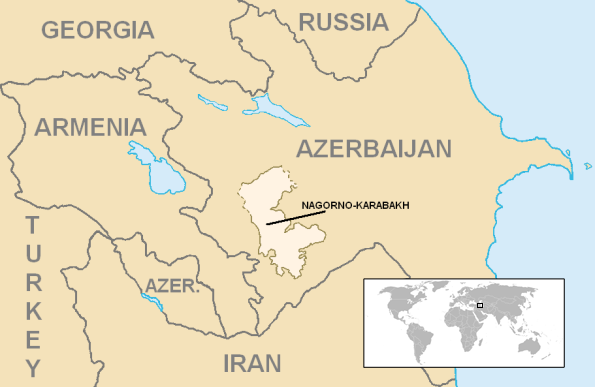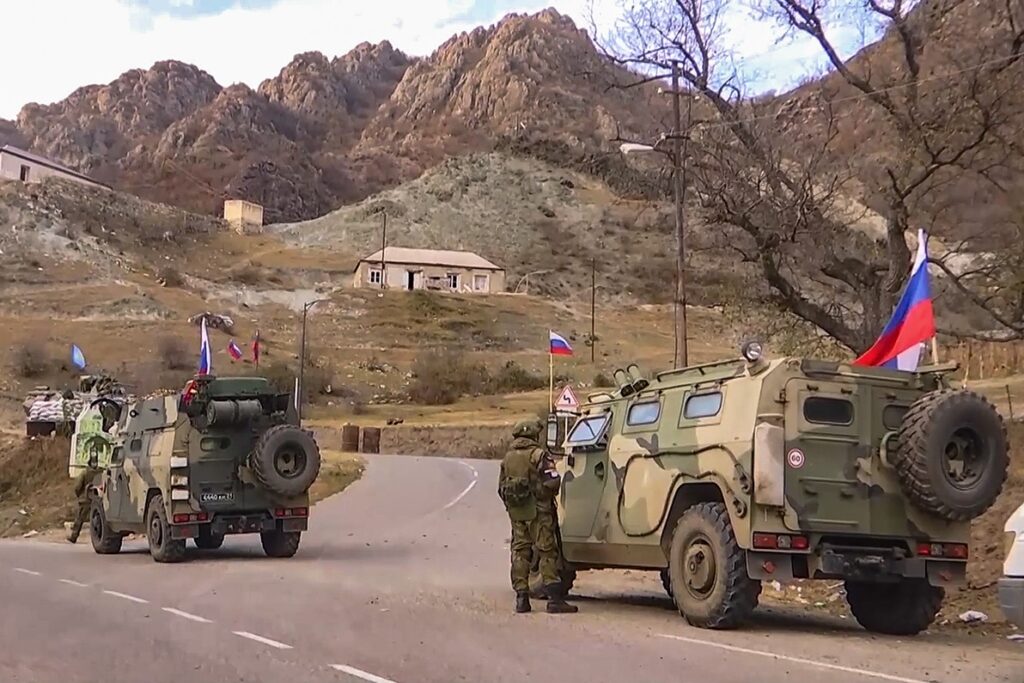Armenia: Nagorno-Karabakh
What
The South Caucasus region, which includes Armenia, Georgia, and Azerbaijan, has been marred by a long-standing conflict between Armenia and Azerbaijan over Nagorno-Karabakh, an ethnically Armenian enclave within Azerbaijan’s borders. It is a complex tale of historical grievances, territorial disputes, and shifting alliances.
In 1923 the USSR had formally declared the region of Nagorno-Karabakh as a semi- autonomous state located fully within the territory of Azerbaijan in the South Caucasus.
Shortly after the 1991 breakup of the USSR, Armenia became caught in the middle of a violent conflict over Nagorno-Karabakh (NK). Without the Soviets to hold both nations back, tensions between Armenia and Azerbaijan, going back decades, escalated to a conflict which in the early 1990s left 30,000 people dead and millions displaced.
Since this fighting in the 1990s, Armenia and Azerbaijan have engaged in a low to high intensity conflict with each side trying to gain control of NK.

Location of Nagorno-Karabakh. Image courtesy of Aivazovsky is unmodified and located in the public domain.
Where
Nagorno-Karabakh, also referred to as Artsakh in Armenia, is a mountainous area located entirely within the borders of western Azerbaijan. It is a highly-sought-after region full of precious metals, natural resources, and strategic value. Historically the area was claimed by Armenia, but over the centuries the land has transferred with many of history’s great empires, from the Persians to the Ottomans.
When
The current conflict began in the early 1990s and has continued ever since. The human cost of the conflict peaked shortly after its inception, with heightened tensions in the late 2010s and early 2020s. As of 2023, Armenia’s hold on NK has weakened and Azerbaijan’s forces have controlled the area, leaving many thousands of ethnic Armenian civilians in jeopardy.
Why
Reasons for the conflict include a clash of ideology, ethnicity, and geography between Armenia and Azerbaijan and the influence exerted by Russia and Turkey. Ultimately, however, the conflict is a clash between two principles of international law: for Armenia, the right to self- determination, and for Azerbaijan, the right to territorial integrity.
Historical Reasons
Given the deep wounds caused by the Ottoman genocide against the Armenians during World War 1, Armenians associate the Azeris, the Turkish-speaking majority of Azerbaijan, as allies of Turkey. Armenia is wary of Turkish influence in the region because of the earlier genocide as well as Turkey’s historical refusal to acknowledge the crimes. Armenia is motivated to maintain control of NK to defend ethnic Armenians from discrimination and ethnic persecution, which have historical precedent. As a landlocked nation nestled between two historic rivals, Armenia’s claim over NK is inspired by a desire to exert self- determination in the face of mistreatment by more powerful nations.
Azerbaijan, however, bases its claim to NK on maintaining territorial integrity. Azerbaijan points to the longstanding internationally-recognized borders and asserts that Armenia should not be allowed to deny territorial integrity solely due to historical grievances with its neighbor to the west, Turkey.
Russia’s reasons for intervention in the conflict begin with the dissolution of the Soviet Union. USSR expansion into the South Caucasus was historically justified by Russia’s desire for self -determination and power into what Russia calls its “near abroad.” Since Russia’s expansion eastward and its consolidation of neighboring states during the Soviet era, Russia has viewed nations within its sphere differently than those on the outside. As a result, Russia is playing both sides in this conflict by arming both Armenia and Azerbaijan to maintain Russia’s historical power in the South Caucasus.
How
The fight over NK peaked in bloodshed following the collapse of the USSR and the struggle is unresolved.
In 2020 the war erupted once again, leaving tens of thousands dead and hundreds of thousands as refugees, most of whom were Armenians. Unlike the previous escalation, Azerbaijan entered the battlefield armed with advanced weaponry and training which had been supplied by Turkish and Israeli militaries. As the dust settled on the 2020 counterattack, Azerbaijan had regained a significant amount of NK territory and a strategic advantage over the area.
On Sept 13, 2022, a significant provocation between the parties occurred as a result of ceasefire violations by both nations. The re-igniting of tensions resulted in the death of several hundred combatants. Additionally, the attack included Azerbaijan’s armed incursion into Armenian territory, causing the evacuation of nearly 3,000 Armenian civilians. In response to the fighting, both sides mounted counter-attacks.

Russian peacekeepers at the checkpoint. Image courtesy of Mil.ru is unmodified and licensed under CC BY 4.0.
Azerbaijani activists blockaded the Lachin Corridor, a highway that connects Armenia to NK. This strategic transportation route for food and medical supplies has played a critical role in the conflict, because whichever side controls the corridor gains a massive tactical advantage. The new Azerbaijan blockade resulted in catastrophic food shortages in the NK region and motivated Russia to deploy an armed peacekeeping force to open transportation along the corridor.
As of April 2023 the corridor was guarded by Russian peacekeepers and an Azerbaijani customs checkpoint designed to intercept military supplies entering Azerbaijan on its way to NK. Armenia condemned the checkpoint as unnecessarily harsh on the Armenian population in NK. Despite Russia’s historic defense of Armenia, its inaction in response to the blockade in the Lachin Corridor eroded Armenia’s trust in Russia and resulted in diplomatic efforts by the EU and the US.
Response
Negotiations brought the leaders of both sides to the diplomatic table.
Fighting calmed as the EU, US, and Russia facilitated peace talks in summer 2023. However, the ideological issues which started the war still remain, as do questions of border security, humanitarian relief, and arms control. Human rights experts are labeling the situation for Armenians as ‘genocide,’ given the impact of the Lachin Corridor blockade in keeping out shipments of food, water, and medical aid.
Future
On September 19, 2023, the president of Nagorno-Karabakh/Artsakh signed a decree dissolving its state institutions following a decisive defeat by Azerbaijan.
Nagorno-Karabakh/Artsakh lies fully within Azerbaijani borders but had long operated autonomously with its own de facto government, although that government had failed to receive global diplomatic recognition.
Azerbaijan’s victory triggered a huge exodus of ethnic Armenians out of the region. Hundreds of thousands of people have fled into Armenia. It is of concern how well Armenia will be able to host and integrate up to 120,000 arrivals in this small and poor nation of 2.8 million people.
Outside Actors
Russia
With Russian forces tied up in Ukraine, Russia’s nominal assistance of Armenia has slowed. Though Russia has been a consistent defender of Armenia, President Vladimir Putin has also proven his interest in maintaining the conflict as a pretext for further influence in the area. Russia supplies weapons to both sides and retains heavy ties with Azerbaijan over oil agreements. Russia’s interests are to maintain a balance of power in the South Caucasus and to use military force to crush resistance to Russian interests.
Turkey
As the first nation to officially recognize Azerbaijan’s statehood after the fall of the USSR, Turkey’s relationship with Azerbaijan is both economic and cultural. Turkey supports Azerbaijan’s claims to NK and sends millions of dollars of military supplies to Azerbaijan. In particular, Turkey has sent a fleet of drones, which have greatly improved Azerbaijani military efforts against Armenia. Analysts suggest that the Turkey’s assistance includes improving influence in the region as a buffer against its historical rival, Russia.
Israel
According to Armenian state media outlets, Israel is responsible for upwards of 70% of Azerbaijan’s weapons of advanced radar, missile, and drone systems. According to Human Rights Watch (HRW), Israel has even sold banned cluster bomb munitions to the Azerbaijani military. HRW has confirmed the use of cluster munitions on civilians in NK.
In exchange for weapons, Azerbaijan allows the Israeli military to maintain a military base to monitor Iranian movements in the region. Israel’s intervention in the conflict has been one of strategy and opportunism, suggesting Israel’s openness to keeping the arms flowing in the future.
Written by James Kile, October 2023.
References
https://www.cfr.org/global-conflict-tracker/conflict/nagorno-karabakh-conflict
https://www.crisisgroup.org/content/nagorno-karabakh-conflict-visual-explainer
https://www.nytimes.com/article/armenia-azerbaijan-clashes.html
https://www.chathamhouse.org/2023/06/fate-vulnerable-minority-looms-over-armenia-azerbaijan-peace
https://www.youtube.com/watch?v=YU2v38hRRbg
https://www.hrw.org/news/2020/10/23/azerbaijan-cluster-munitions-used-nagorno-karabakh
https://www.cnn.com/2023/09/28/europe/nagorno-karabakh-officially-dissolve-intl/index.html


